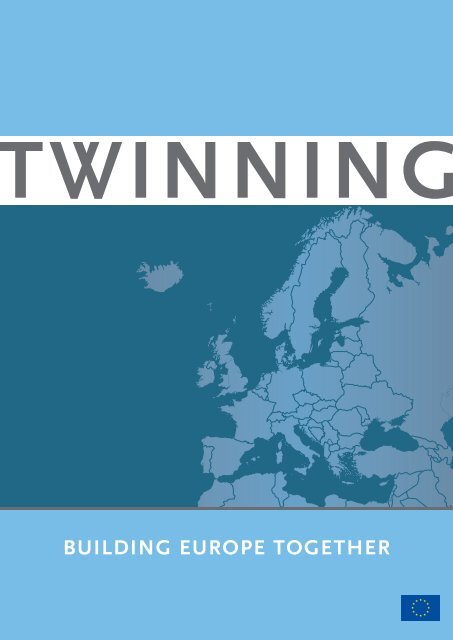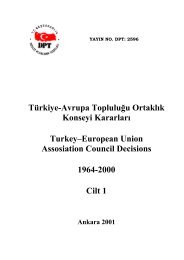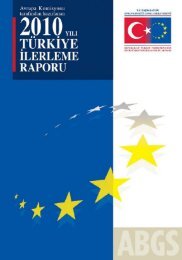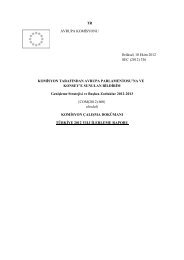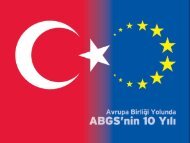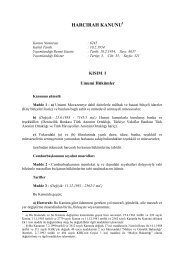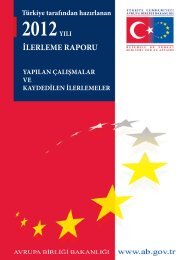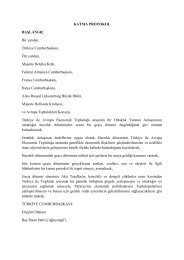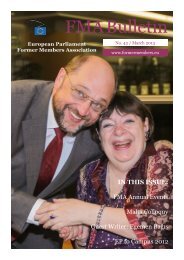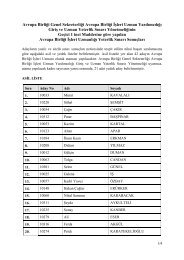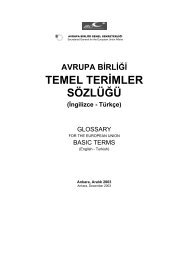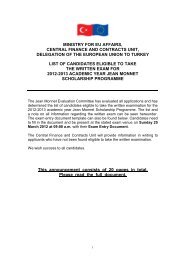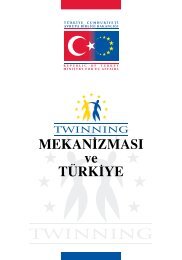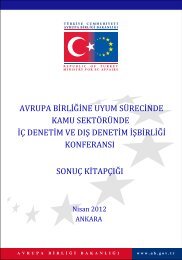brochure Twinning.indd
brochure Twinning.indd
brochure Twinning.indd
Create successful ePaper yourself
Turn your PDF publications into a flip-book with our unique Google optimized e-Paper software.
WINNING<br />
BUILDING EUROPE TOGETHER
LEGAL NOTICE<br />
Neither the European Commission nor any person acting on behalf of the Commission is responsible for the use<br />
which might be made of the following information.<br />
The views expressed in this publication are the sole responsibility of the author and do not necessarily reflect the<br />
views of the European Commission.<br />
A great deal of additional information on the European Union is available on the Internet.<br />
It can be accessed through the Europa server (http://ec.europa.eu).<br />
Cataloguing data can be found at the end of this publication.<br />
Luxembourg Office for Official Publications of the European Communities, 2005<br />
ISBN 92-79-00892-7<br />
© European Communities, 2006<br />
Reproduction is authorised provided the source is acknowledged.<br />
Printed in Belgium<br />
PRINTED ON WHITE CHLORINE-FREE PAPER
FOREWORD<br />
Enlargement is one of the European Union’s most powerful policy tools to pursue peace and prosperity,<br />
liberty and democracy. The Eastern enlargement of 2004 sealed the peaceful reunifi cation of Europe. As a<br />
result, ten countries joined the EU on 1 May 2004.<br />
In spring 2005, the EU signed an accession treaty with Bulgaria and Romania who are to join the Union<br />
in 2007, provided they are fully prepared and there is no need to postpone their accession by a year. Later<br />
in the year, the Union opened accession negotiations with Turkey and Croatia, and the former Yugoslav<br />
Republic of Macedonia became a candidate for future EU membership. A convincing political perspective<br />
for eventual integration into the EU is proposed to the countries of the Western Balkans, if they meet the<br />
accession criteria in full.<br />
2005 was a busy year for enlargement in which we maintained the momentum. Similarly, the European<br />
Commission’s on-going delivery of technical assistance and institution building programmes – so essential<br />
to helping those countries on the path to membership – continued apace. In this respect, the <strong>Twinning</strong><br />
programme has long been an integral feature of the pre-accession strategy helping benefi ciary countries to<br />
develop modern administrations able to take on the obligations of membership.<br />
In 2005, the total number of <strong>Twinning</strong> projects benefi ting over 25 countries over the last seven years<br />
exceeded 1,000, underpinned by over €1 billion of EU investment. These projects embody the Enlargement<br />
process. They facilitate an exchange of best practices and experiences while at the same time reflecting<br />
the Union’s policy priorities. They encourage the establishment of networks based on a partnership where<br />
nonetheless the benefi ciary country is the driving force for change. This relationship through <strong>Twinning</strong> will<br />
retain its value and continue to be made available to a host of new countries in the years to come.<br />
It is therefore with great pleasure that I present this booklet on <strong>Twinning</strong>. It provides a broad overview of<br />
how it functions and the diverse range of activities involved. It describes an effective instrument proven<br />
through many years experience. <strong>Twinning</strong> will continue to be a valuable asset to help consolidate and carry<br />
forward what the Union has achieved so far.<br />
Olli Rehn<br />
Commissioner for Enlargement<br />
1
TWINNING CONTENTS<br />
FOREWORD by Commissioner Rehn 1<br />
<strong>Twinning</strong> Contents 2<br />
<strong>Twinning</strong> Mission 3<br />
Introduction 4<br />
2006 and Beyond: New Challenges 5<br />
• New Member States 5<br />
• Acceding Countries 5<br />
• Candidate Countries 5<br />
• Western Balkans 6<br />
<strong>Twinning</strong> Activities 7<br />
What is <strong>Twinning</strong>? 8<br />
• Key Features of <strong>Twinning</strong> 8<br />
• Success of a <strong>Twinning</strong> Project 9<br />
Who does what? 10<br />
• Benefi ciary Country 11<br />
• Member State 12<br />
• European Commission 13<br />
<strong>Twinning</strong> Project Cycle 14<br />
<strong>Twinning</strong> in Practice - Case Studies 15<br />
• Redesigning a Criminal Intelligence System 15<br />
• Cleaning up Waste Legislation in Turkey 16<br />
• Bulgarian Judiciary takes steps to reform 17<br />
• Implementing the Dublin Regulation in Slovakia 18<br />
• Modernising the Romanian wine sector 19<br />
Facts and Figures 20<br />
<strong>Twinning</strong> Benefi ciaries 22<br />
2
TWINNING MISSION<br />
For the new Member States, the accession countries,<br />
the candidate countries and the potential candidate<br />
countries of the Western Balkans and the Turkish<br />
Cypriot community in the northern part of Cyprus<br />
• to provide institution building support with the view<br />
to assisting with the transposition, implementation<br />
and enforcement of the EU acquis<br />
• to organise targeted medium-term administrative<br />
co-operation for the benefi t of EU partner<br />
administrations calling on public sector expertise<br />
in the Member States<br />
• to meet precisely defi ned EU policy objectives<br />
formally designed with the Benefi ciary Country<br />
notably through the long-term secondment of<br />
Resident <strong>Twinning</strong> Advisors<br />
3
INTRODUCTION<br />
ENLARGEMENT is and will continue to be one of the<br />
most important undertakings of the Union at the start<br />
of the 21 st century. In 2004, the Union experienced<br />
its biggest ever enlargement with the accession of<br />
10 new countries – Cyprus, Czech Republic, Estonia,<br />
Hungary, Latvia, Lithuania, Poland, Malta, Slovak<br />
Republic and Slovenia. Following this, Bulgaria and<br />
Romania are expected to enter the Union in 2007 if<br />
they are ready, or in 2008 at the latest.<br />
Accession negotiations started with Croatia and<br />
Turkey in 2005, while the former Yugoslav Republic<br />
of Macedonia became a candidate for future<br />
membership of the European Union. Concerning<br />
the Western Balkans, the priority for the EU remains<br />
the promotion of stability and peace in the region,<br />
not only on humanitarian grounds but also in<br />
terms of institutional and economic development<br />
with the wider objective of security and prosperity<br />
across Europe. In this regard, relations with the<br />
other countries of the Western Balkans – Albania,<br />
Bosnia and Herzegovina, Serbia and Montenegro<br />
and Kosovo 1 – have intensifi ed as the Union started<br />
to shift its focus.<br />
One of the great challenges for new Member<br />
States, acceding, candidate or potential candidate<br />
countries is to reform, adapt and strengthen their<br />
public institutions in order to apply well the EU rules<br />
and procedures, or the acquis communautaire, and<br />
benefi t fully from membership of the Union. The<br />
need to bring assistance with real added value in this<br />
context has also been a challenge to the Union. The<br />
<strong>Twinning</strong> programme is one such response where<br />
the European Commission, the EU Member States<br />
and the partner Benefi ciary Countries have mobilised<br />
signifi cant human and fi nancial resources to meet<br />
this challenge.<br />
Launched in May 1998, <strong>Twinning</strong> is now one<br />
of the principal tools of ‘Institution Building’<br />
assistance. <strong>Twinning</strong> aims to help benefi ciary<br />
countries in the development of modern and<br />
effi cient administrations, with the structures,<br />
human resources and management skills needed<br />
to implement the acquis communautaire. <strong>Twinning</strong><br />
provides the framework for administrations and<br />
semi-public organisations in the benefi ciary<br />
countries to work with their counterparts within the<br />
EU. Together they develop and implement a targeted<br />
project aimed at supporting the transposition,<br />
enforcement and implementation of a specifi c part<br />
of EU acquis.<br />
The European Commission has committed over<br />
€1 billion to <strong>Twinning</strong> involving the implementation<br />
of more than 1,100 projects in over 25 countries.<br />
Almost one half of these projects concerns Justice,<br />
Freedom and Security issues, Public Finance and<br />
Internal Market matters. Other areas prioritised<br />
include Agriculture and Fisheries, Environment<br />
policy and Social policy.<br />
The contribution of <strong>Twinning</strong> was recognised by the<br />
European Court of Auditors in its report of 2003:<br />
“<strong>Twinning</strong> is … a positive initiative by the European<br />
Commission to assist candidate countries in acquiring<br />
the capacity to adopt, implement and enforce the<br />
acquis communautaire. The <strong>Twinning</strong> projects acted<br />
as a catalyst in setting the candidate countries’ reform<br />
in motion, bringing together specialists from MS and<br />
candidate countries’ administrations and promoting<br />
the adoption of the Community legislation (…).” 2<br />
4<br />
1 As defined in UN Security Council Resolution 1244 of 10 June 1999<br />
2 The full version of the Court of Auditors report can be found under: http://www.eca.eu.int/audit_reports/special_reports/docs/2003/rs06_03en.pdf
2006 AND BEYOND:<br />
NEW CHALLENGES<br />
<strong>Twinning</strong> has evolved over time. In 2004, Accession<br />
gave the impetus for a greater co-ordinated approach<br />
to <strong>Twinning</strong>. One year later, the Commission’s<br />
General Directorate for Enlargement co-ordinates<br />
<strong>Twinning</strong> activities for all the beneficiary countries,<br />
namely the ten new Member States, Bulgaria, and<br />
Romania, Croatia, the former Yugoslav Republic<br />
of Macedonia, Turkey, and the Western Balkans.<br />
<strong>Twinning</strong> is constantly adapting to the new<br />
environment to ensure that the demand for this<br />
support for the reinforcement of administrative and<br />
judicial capacity in partner countries will be met.<br />
Simplified and harmonised rules and procedures for<br />
the application of <strong>Twinning</strong> assistance in different<br />
regions came into force in May 2005. 3<br />
NEW MEMBER STATES<br />
The European Commission will continue to provide<br />
<strong>Twinning</strong> assistance to the new Member States, for<br />
which a limited number of projects will be launched<br />
under 2006 budget (Transition Facility). In order<br />
to ensure continuity, stability and simplicity, the<br />
current structures and methods established for<br />
programming, decision making and implementation<br />
will remain in place.<br />
Indeed since the 2004 enlargement, <strong>Twinning</strong><br />
now also calls on new Member State expertise<br />
for the benefi t of others. Good use can be made<br />
of their expertise acquired at central, regional or<br />
local level through their own successful transition<br />
phase of legislative approximation to the acquis<br />
communautaire, and the process of learning best<br />
practices. New Member States are well placed to<br />
turn provider of expertise and share their knowledge<br />
with the administrations of the Acceding and<br />
Candidate Countries and the Western Balkans.<br />
ACCEDING COUNTRIES<br />
Bulgaria and Romania signed the Treaty of Accession<br />
with the European Union on 25 April 2005. The<br />
European Commission has noted that both countries<br />
have made good progress in their preparations for<br />
joining the Union. They should now focus efforts on<br />
further reform with particular emphasis on concrete<br />
and practical implementation of the acquis. Both<br />
countries have benefi ted greatly over the years<br />
from <strong>Twinning</strong>. It is expected that in 2006, further<br />
<strong>Twinning</strong> projects will be instrumental in assisting<br />
these countries to focus on the further refi nement<br />
of acquis implementation. By reinforcing the<br />
institutional and administrative capacity necessary<br />
to take on the obligations of membership, <strong>Twinning</strong><br />
will help them to benefi t to the maximum from<br />
becoming a member of the Union. Institution<br />
Building assistance is scheduled beyond accession<br />
to consolidate the administrative capacities of both<br />
countries during the fi rst years into membership<br />
and at least until 2008.<br />
CANDIDATE COUNTRIES<br />
Croatia and Turkey are now proceeding with accession<br />
negotiations while the former Yugoslav Republic<br />
of Macedonia was made a candidate in 2005. They<br />
will have to demonstrate their resolve and ability<br />
to complete the necessary transformations to<br />
implement community legislation. <strong>Twinning</strong> will<br />
therefore remain an essential tool at their service to<br />
reach the required level of administrative and judicial<br />
capacity. The current approach to both Croatia and<br />
Turkey as candidate countries is “accession-driven”<br />
concentrating on supporting priority areas aimed<br />
at helping these countries in preparing for EU<br />
membership.<br />
3 All relevant documentation including the updated Common <strong>Twinning</strong> Manual is available at: http://ec.europa.eu/enlargement/twinning/index_en.htm<br />
5
WESTERN BALKANS – POTENTIAL CANDIDATE<br />
COUNTRIES<br />
The Western Balkans represent a particular<br />
challenge for the EU. On the one hand, a credible<br />
political perspective for eventual integration into<br />
the EU is crucial to keep their reforms on track.<br />
However it is equally clear that these countries can<br />
join only once they have met membership criteria in<br />
full. Each country has to follow the road map setting<br />
out the steps and conditions for realising their<br />
European objectives, including the development<br />
and management of fi nancial assistance.<br />
Between 2000 and 2005, some 65 <strong>Twinning</strong> projects<br />
were successfully launched for the administrations of<br />
the Western Balkans. With greater capacity, Croatia<br />
received the lion share while the remainder were<br />
evenly distributed among the other administrations.<br />
Projects took place mostly in the area of Freedom,<br />
Security and Justice, but also covered public fi nance<br />
and internal market issues, and agriculture and<br />
fi sheries. <strong>Twinning</strong> is expected to play an increasing<br />
role in the Institution Building efforts towards the<br />
Western Balkans required in the years ahead.<br />
6
TWINNING ACTIVITIES
WHAT IS TWINNING?<br />
Under <strong>Twinning</strong>, an EU Member State expert, a<br />
practitioner in the implementation of the acquis,<br />
is seconded to a new Member State, acceding,<br />
candidate or potential candidate country to effect<br />
long-term change. The expert, known as a “Resident<br />
<strong>Twinning</strong> Adviser” or RTA is an individual seconded<br />
from a Member State administration or other<br />
approved body in a Member State to work full time<br />
for up to two years in the corresponding ministry<br />
in the Benefi ciary Country to help implement an<br />
agreed project with targeted goals and objectives.<br />
The RTA is supported by a senior Project Leader in<br />
their Member State home administration, who is<br />
responsible for ensuring project implementation<br />
and co-ordination of input from the Member State.<br />
KEY FEATURES OF TWINNING ARE:<br />
• Projects are built around jointly agreed EU policy<br />
objectives<br />
Project objectives are derived from European<br />
Commission programming towards the countries<br />
concerned. The <strong>Twinning</strong> partners agree in advance<br />
on a detailed Work Plan to meet an objective related<br />
to priority areas of the acquis, as set out in the policy<br />
orientations and informed by European Commission<br />
Progress Reports and Monitoring exercises. Such<br />
a focus is ensured by input from the European<br />
Commission at conception, project design and at<br />
assessment phase.<br />
• Beneficiary Country retains ownership of project<br />
The Benefi ciary Country has the right to choose<br />
the Member State partner it considers appropriate<br />
to jointly implement its <strong>Twinning</strong> project. The<br />
Benefi ciary Country is in the driving seat throughout.<br />
To underpin the credibility of their commitment,<br />
the <strong>Twinning</strong> partners draft together a detailed<br />
Work Plan that can be adapted in the course of its<br />
implementation. Further, the success of a <strong>Twinning</strong><br />
project relies on the full determination of the<br />
Benefi ciary Country to carry out reforms and the<br />
reorganisation needed. These arrangements place<br />
the fi nal and sole ownership of the <strong>Twinning</strong> project<br />
fi rmly with the Benefi ciary Country.<br />
• Projects yield concrete operational results linked<br />
to EU acquis adoption<br />
<strong>Twinning</strong> projects set out to deliver specifi c and<br />
guaranteed results relating in some form to the<br />
implementation of priority areas of the acquis.<br />
Focusing on limited, relatively clear and well defi ned<br />
institutional targets, the successful project aims to<br />
reach an operational outcome in a particular fi eld.<br />
All project partners commit themselves to work<br />
towards a commonly agreed result throughout the<br />
period of the project. Progress towards this end<br />
measured by clear benchmarks also undergoes<br />
continuous monitoring through Interim Quarterly<br />
and Final Reports.<br />
• Projects involve a peer-to-peer exchange of handson<br />
public sector expertise and experience<br />
<strong>Twinning</strong> assistance involves a know-how exchange<br />
at public sector level between peers. All experts are<br />
experienced practitioners from a Member State<br />
administration. Areas primarily covered often<br />
concern the exclusive remit of the state, such as<br />
border management. For example, there are few, if<br />
any, private sector advisers who can give Benefi ciary<br />
Countries the advice and assistance they require in<br />
such a sensitive area.<br />
8
• Projects are a genuine partnership fostering close<br />
co-operation<br />
As the Benefi ciary Country retains ownership, the<br />
relationship with the Member State is one of a<br />
partnership with a joint responsibility to achieve the<br />
agreed outcomes, and not client-contractor in nature.<br />
Lasting up to two years and with the possibility of<br />
targeted follow-up, <strong>Twinning</strong> provides technical and<br />
administrative assistance over a signifi cant period.<br />
This process helps to build long-term relationships<br />
between old, new and future Member States, and at<br />
the same time brings the Benefi ciary Country into<br />
a wider contact with the diversity of administrative<br />
practices inside the EU.<br />
<br />
<br />
<br />
<br />
<br />
<br />
<br />
<br />
<br />
<br />
<br />
<br />
<br />
<br />
<br />
<br />
<br />
<br />
<br />
<br />
<br />
<br />
9
WHO DOES WHAT?<br />
WHO ARE THE STAKEHOLDERS?<br />
<br />
<br />
<br />
<br />
<br />
<br />
<br />
<br />
<br />
<br />
<br />
<br />
<br />
<br />
<br />
<br />
10
BENEFICIARY COUNTRY<br />
The whole Project Cycle starts with the Beneficiary<br />
Country through a demand-driven process.<br />
<strong>Twinning</strong> therefore is more likely to be successful if<br />
the Beneficiary Country is fully determined to carry<br />
out the reforms and reorganisation required in the<br />
context of accession to the European Union and in the<br />
context of the particular project. Indeed, the arrival<br />
of a Member State expert to transfer know-how is<br />
not to lighten the workload of the administration: in<br />
fact, the workload often rises. Therefore, only if the<br />
RTA’s counterparts in the Beneficiary administration<br />
are fully committed to the process can the project<br />
be made to work. Such an engagement must occur<br />
at all levels of the project and at different moments<br />
of the process:<br />
• The Benefi ciary Country must give a clear political<br />
engagement in the project from the start, in full<br />
knowledge that this might entail far reaching<br />
reforms, which should subsequently be manifested<br />
in a practical commitment of human and fi nancial<br />
resources to undertake those reforms<br />
• The Benefi ciary Country administration needs to<br />
work closely with the services of the European<br />
Commission to develop a specifi c and targeted<br />
<strong>Twinning</strong> fi che in the context of general policy<br />
orientations, with an identifi able concrete<br />
operational result<br />
• The Benefi ciary partner in a joint exercise with the<br />
Member State, drafts the detailed project design,<br />
fi ne-tuning targets, lending the necessary expertise<br />
and knowledge of local specifi cities and taking<br />
responsibility for components where further local<br />
support can be mobilised<br />
• The Benefi ciary Ministry or Agency driving<br />
the project forward must be committed to the<br />
implementation of the project throughout the<br />
duration of the <strong>Twinning</strong>, ensuring that the right<br />
pre-conditions for success are met, respecting<br />
clear benchmarks permitting close monitoring of<br />
progress towards the fi nal result<br />
• The Benefi ciary National Contact Point plays a<br />
central role in the development and co-ordination,<br />
and particularly communication between the host<br />
administration and the European Commission,<br />
channelling information on the process and<br />
development of a <strong>Twinning</strong> project<br />
• The Benefi ciary administration through an<br />
Administrative Offi ce is also very often closely<br />
involved in the procedural and fi nancial<br />
management of the <strong>Twinning</strong> projects.<br />
• The Beneficiary partner should assess Member State<br />
proposals in an objective manner, making a selection<br />
of a proposal of one or more member States with<br />
full regard to clear respective responsibilities in a<br />
shared project with clear goals<br />
• To ensure equality and sustainability, the Beneficiary<br />
needs to appoint counterparts to the Resident<br />
<strong>Twinning</strong> Advisor and Project Leader with the aim also<br />
of developing a genuine partnership and at the same<br />
time creating ownership of the <strong>Twinning</strong> project<br />
11
MEMBER STATE<br />
Under the <strong>Twinning</strong> programme, the different<br />
members of the core team within a Member State<br />
are the Resident <strong>Twinning</strong> Advisor (RTA), the Project<br />
Leader (PL), and the National Contact Point (NCP).<br />
All have an important role to play in the transfer of<br />
specialised hands-on expertise on transposition,<br />
implementation or enforcement of certain aspects<br />
of the acquis communautaire. A Member State may<br />
implement a project alone or in a consortium of<br />
usually no more than two Member States. Alone or<br />
not, the Member State remains at the heart of the<br />
Institution Building project:<br />
• The Member State engages, in the hope of being<br />
selected, in the initial selection phase allocating<br />
time and resources to draft a Project proposal with<br />
the key aspects of the Member State’s approach,<br />
and travels to the Benefi ciary Country to present<br />
and defend the proposal<br />
• The home administration makes carefully planned<br />
and timed short-term missions bringing other<br />
Short-Term Experts (STEs), specialised training<br />
events, awareness raising visits, to accompany<br />
and support the reform process towards the<br />
targeted result<br />
• The Member State National Contact Point plays a<br />
central role in promotion and co-ordination and<br />
particularly communication between its team<br />
and the European Commission, channelling<br />
information on the process and development at<br />
different stages of a <strong>Twinning</strong> project.<br />
• The selected Member State partner in a joint<br />
exercise with the Benefi ciary, elaborates the<br />
original proposal into a detailed Project including a<br />
sequence of activities, a strategy aimed at achieving<br />
the result and a clear allocation of management<br />
responsibilities to stakeholders<br />
• The RTA is seconded to the corresponding<br />
Ministry in the Benefi ciary Country to implement<br />
the project on a day-to-day basis and over a period<br />
of up to two years in co-operation with Benefi ciary<br />
counterparts: the RTA is the backbone of the<br />
<strong>Twinning</strong> project on whose flexibility, commitment<br />
and quality the project’s success often depends<br />
• The Project Leader is a high-ranking offi cial in the<br />
Member State home administration providing<br />
institutional support to the RTA, ensuring the<br />
overall direction of the project implementation,<br />
by coordinating other Member State inputs and<br />
through regular monitoring<br />
12
EUROPEAN COMMISSION<br />
The European Commission plays a role at different<br />
stages in the lifecycle of a <strong>Twinning</strong> project:<br />
Directorate General for Enlargement in a political and<br />
co-ordination role, the sectoral Directorates General<br />
bringing substantive input or the Delegation or<br />
European Agency for Reconstruction guiding and<br />
monitoring on the ground. The different services of<br />
the Commission act as a facilitator and guardian of<br />
fair, transparent and consistent application of the<br />
<strong>Twinning</strong> rules and procedures. They also provide<br />
the global vision required for multi-stakeholder<br />
projects, and a quality control across the board<br />
ensuring value for money. Key tasks are:<br />
• Setting priorities with the Benefi ciary Country<br />
and allocating funds to <strong>Twinning</strong> projects in<br />
the programming of the appropriate fi nancing<br />
instruments (National Programmes under PHARE,<br />
CARDS and Transition Facility)<br />
• Promoting the instrument in the enlargement<br />
context and by its European visibility thereby<br />
generating interest and a high uptake of this<br />
Institution Building assistance by Benefi ciary<br />
partners<br />
• Activating and revitalising both at project<br />
implementation level as well as at the level of<br />
political commitment the network of National<br />
Contact Points, crucial for the promotion,<br />
development and co-ordination of activities within<br />
Member States and Benefi ciary administrations<br />
• Providing substantive input to the project<br />
at conception phase in the design of project<br />
fi ches, ensuring achievable targets and concrete<br />
operational results match the priorities as identifi ed<br />
within policy priorities; and subsequently advising<br />
the <strong>Twinning</strong> partners in designing a detailed Work<br />
Plan, with realistic proposals to reach the desired<br />
intended outcomes<br />
• Formally appraising the detailed Work Plan through<br />
a Steering Committee procedure with specifi c<br />
regard to the credibility of the Work Plan in relation<br />
to the targeted concrete result and the accuracy<br />
and relevance of the underlying Community<br />
legislation<br />
• Contributing to the success of the project itself<br />
by providing an initial training for the RTA at<br />
Commission Headquarters; monitoring and<br />
evaluating the on-going project at Delegation level<br />
through the Interim Quarterly reports and the<br />
Final report<br />
• Throughout the whole cycle, the Commission also<br />
provides a full range of administrative support<br />
involving general co-ordination, advice on rules<br />
and procedures on interpreting the Common<br />
<strong>Twinning</strong> manual 1 , and generally acts as a problem<br />
solver and facilitator.<br />
• Setting the legal, fi nancial, and procedural<br />
framework for <strong>Twinning</strong> projects in order to<br />
secure transparency and maintain uniform<br />
implementation, underpinned by the central helpdesk<br />
function bringing together all stakeholders,<br />
carried out by the <strong>Twinning</strong> Co-ordination team of<br />
Directorate general for Enlargement<br />
1 Some special procedures are necessary to take into account the particular nature of <strong>Twinning</strong> and to ensure sound financial management.<br />
These procedures are laid down in the regularly updated Common <strong>Twinning</strong> manual which can be found with other relevant documents<br />
at the following on-line address: http://ec.europa.eu/enlargement/financial_assistance/institution_building/index_en.htm<br />
13
TWINNING PROJECT CYCLE<br />
Identification of Project: Benefi ciary Country identifi es needs within European Commission policy<br />
orientations and drafts <strong>Twinning</strong> Fiches with the assistance of the European Commission<br />
Launch of Proposals: Circulation of <strong>Twinning</strong> fi ches to Member State National Contact points<br />
highlighting desirable concrete outcomes<br />
Submission of Proposals: Member State(s) – alone or in consortium – prepares and submits a proposal<br />
with designated RTA and PL explaining key points of approach on how to achieve the targeted result<br />
Selection of Proposal: Benefi ciary Country assesses proposals and following presentation of proposal<br />
by Member State RTAs and PLs, makes fi nal selection<br />
Preparation & Finalisation of Work Plan: Member State and Benefi ciary Country together draw up<br />
<strong>Twinning</strong> contract with detailed budgeted Work Plan outlining achievable targets<br />
Review of Contract with EC input: European Commission and Administrative Offi ce assess <strong>Twinning</strong><br />
Work Plan through Steering Committee. <strong>Twinning</strong> Contract is signed by all Parties<br />
Project Implementation: Focusing on achievable targets RTA in place executes project in Benefi ciary<br />
Country supported by Project Leader and Member State administration<br />
Monitoring & Reporting: progress is monitored by EC Delegation and Benefi ciary Country<br />
Administrative Offi ce and is measured by Interim Quarterly Reports and a Final Report<br />
Evaluation: <strong>Twinning</strong> Project is evaluated by external auditor and Court of Auditors<br />
14
TWINNING IN PRACTICE - CASE STUDIES<br />
REDESIGNING A CRIMINAL<br />
INTELLIGENCE SYSTEM<br />
Intelligence-led policing allows law enforcement to<br />
be one step ahead: it focuses resources to maximum<br />
effect and it increases effi cacity and maximises the<br />
cost-benefi t ratio. Croatia recognised the strategic<br />
importance of an effective Criminal Intelligence<br />
System (CIS) in 2001 and the arrival of the UK<br />
<strong>Twinning</strong> team quickly gave their efforts a new<br />
impetus and resilience.<br />
The general objective of this <strong>Twinning</strong> was to<br />
strengthen Croatia’s capacity to deal effi ciently and<br />
effectively with the fi ght against organised crime<br />
and terrorism. Concrete objectives were to:<br />
• Introduce and develop standards for all administrative<br />
procedures concerning the processing of criminal<br />
intelligence data<br />
• Further improve criminal intelligence management<br />
by integration and standardisation of all components<br />
and levels of the CIS, by designing a central<br />
repository of criminal intelligence information,<br />
and by improved intelligence procedures and<br />
methodologies for exchanging information<br />
• Develop a sustainable selection, recruitment,<br />
education and training system, including curricula<br />
development and a train-the-trainer programme<br />
for criminal intelligence analysts and offi cers.<br />
The strong commitment from all sides allowed<br />
the project to make a rapid impact on business<br />
processes inside the Croatian Ministry of Interior.<br />
Concise and succinct reports, involving some 80<br />
precise recommendations, proposed a de facto<br />
action plan which links up with related projects in<br />
the fi eld of fi ghting organised crime.<br />
“<strong>Twinning</strong> can be fl exible. The full extent of<br />
the project only becomes clearer once the RTA<br />
is in place and able to see in detail the current<br />
situation and what solutions are required. From<br />
an initial objective of developing analysis skills<br />
and capacity, the goals have developed to deliver<br />
more than expected through broader inter-agency<br />
co-operation. We’re making a difference… The<br />
[<strong>Twinning</strong>] concept is good; the idea of sharing<br />
experience and knowledge, but a lot depends on<br />
the benefi ciary. The question is sustainability.”<br />
Resident <strong>Twinning</strong> Adviser Mr James M. Heslop<br />
NCIS Intelligence Offi cer, UK<br />
Moreover, although the earlier system developed<br />
by Croatia had technical merit, this <strong>Twinning</strong> has<br />
added strongly needed developments in terms of<br />
inter-agency collaboration between the Crime Police<br />
and other key players in the fi ght against organised<br />
crime including Customs, the Anti-Corruption and<br />
Organised Crime Offi ce (USKOK), the Anti-Money<br />
Laundering Offi ce and the Tax Authorities. Since<br />
intelligence depends on information, the more<br />
sources of information available and the better the<br />
coordination between them, the better the overall<br />
result. A system can be more than its parts. This<br />
twinning project proves it.<br />
Title of Project: Criminal Intelligence System<br />
Benefi ciary Country: Croatia<br />
MS Partner:<br />
Home Offi ce, UK<br />
BC Ministry: Ministry of Interior, Croatia<br />
Implementation period: May 2005 - August 2006<br />
Funding: € 700,000<br />
2000-2005 HR has 33 <strong>Twinning</strong> projects;<br />
2000-2005 HR has 17 in the field of JLS<br />
15
TWINNING IN PRACTICE - CASE STUDIES<br />
CLEANING UP WASTE<br />
LEGISLATION IN TURKEY<br />
EU environment policy aims to promote sustainable<br />
development and protect the environment for<br />
present and future generations. It is based on<br />
preventive action – the polluter pays principle –<br />
fi ghting environmental damage at source, shared<br />
responsibility and the integration of environmental<br />
protection into other EU policies. The acquis<br />
comprises over 200 major legal acts covering<br />
water and air quality, waste management, nature<br />
protection, industrial pollution control and risk<br />
management, chemicals and genetically modifi ed<br />
organisms (GMOs), noise and forestry.<br />
Turkey’s waste management system, specifi cally<br />
on hazardous and special waste, unfortunately<br />
has not moved apace with economic growth. This<br />
is causing direct and indirect public health risks<br />
and a deterioration of the ecosystem and natural<br />
resources. Awareness of environmental risks is<br />
however growing. With a view to developing stricter<br />
standards, the Turkish administration recognised<br />
the need for assistance in terms of legislative<br />
measures, monitoring requirements, methods of<br />
measurements and enforcement.<br />
To help address the issue, the German Federal<br />
Ministry for Environment, Nature Conservation<br />
and Nuclear Safety was selected for a two year<br />
<strong>Twinning</strong> project aimed specifi cally at developing<br />
the capacity in institutional, technical and fi nancial<br />
issues within the Turkish Ministry of Environment<br />
and Forestry. A well-designed project in terms<br />
of work flow, activities and project outcomes<br />
and objectives has led to an effi cient committed<br />
<strong>Twinning</strong> team working towards the transposition<br />
and implementation of six specifi c EU Directives:<br />
• Packaging Waste Directive (94/62/EC)<br />
• Waste Management Framework Directive<br />
(75/442/EEC)<br />
“We have tried to help Turkey to transpose six<br />
Directives in the fi eld of waste management. We<br />
make proposals and recommendations; we help<br />
draft the law, but it is Turkey’s responsibility to<br />
transpose the legislation. Transposition is one<br />
thing, implementation is another as it costs so<br />
much. Transposition is connected to investments<br />
for landfi ll and building incineration plants etc.<br />
This is why the process is sometimes slow…The<br />
technical level however is working hard and willing<br />
to carry out all the recommendations. We fi nish in<br />
September 2006 and we are on track.”<br />
Resident <strong>Twinning</strong> Adviser Mr Horst Seida,<br />
Federal Ministry of the Environment, Nature<br />
Conservation and Nuclear Safety, Germany<br />
• Hazardous Waste Directive (91/689/EC)<br />
• Waste Incineration Directive (2000/76/EC)<br />
• Landfi ll Directive (99/31/EC)<br />
• Shipment of Waste Directive (93/259/EC)<br />
At the same time compliance with the acquis requires<br />
significant investment. A strong and well-equipped<br />
administration at national and local level is imperative<br />
for the application and enforcement of the environment<br />
acquis. In this regard, this targeted assistance will<br />
support the development of an overall Strategic<br />
Action Plan underpinning the efforts to implement an<br />
integrated waste management system.<br />
Title of Project: Air Quality, chemicals,<br />
waste: component waste<br />
Benefi ciary Country: Turkey<br />
MS Partner: Federal Ministry of the<br />
Environment, Nature Conservation<br />
and Nuclear Safety, Germany<br />
BC Ministry: Ministry of Environment<br />
and Forestry, Turkey<br />
Implementation Period: September 2004 - September 2006<br />
Funding amount: € 1.400.000 mio<br />
1998-2005 TR has 56 <strong>Twinning</strong> projects;<br />
1998-2005 TR has 8 in the fi eld of environment<br />
16
TWINNING IN PRACTICE - CASE STUDIES<br />
BULGARIAN JUDICIARY TAKES<br />
STEPS TO REFORM<br />
The reform of the Judiciary is a key strategic area<br />
where Bulgaria needs to progress in order to achieve<br />
a surer path towards accession. In recognition that<br />
such reform will require a long term effort and<br />
sustainable systemic change, Bulgaria adopted a fiveyear<br />
Strategy for Reform of the Judiciary to address<br />
the full range of institutional and material problems.<br />
To support this Strategy and to help Bulgaria meet<br />
EU standards and practices in terms of quality of<br />
justice, the European Commission agreed with<br />
the Ministry of Justice and the Supreme Judicial<br />
Council of Bulgaria a range of assistance measures.<br />
Firstly, to improve access to justice; secondly, to<br />
improve the court decisions enforcement system to<br />
ensure effective and timely protection of the rights<br />
of citizens and legal entities; thirdly to introduce<br />
IT-based procedures to make courts more effi cient.<br />
A further important element of assistance to the<br />
Strategy for Reform – to strengthen the National<br />
Institution for Professional Qualifi cation – came in<br />
the form of a 15-month <strong>Twinning</strong> project between<br />
the Ministry of Justice and the Supreme Judicial<br />
Council of Bulgaria and the French School for the<br />
Judiciary in June 2004.<br />
The main objective of the partnership was to develop<br />
a programme for upgrading capacities and resources.<br />
This involved training the trainers of the Institute as<br />
well as curriculum developers, and updating and<br />
upgrading training programmes for magistrates.<br />
The curriculum focused particularly on judicial<br />
co-operation in civil and criminal matters, fighting<br />
against organised forms of trans-border crime,<br />
economic crime, EU law and human rights law.<br />
“The <strong>Twinning</strong> had a local and a European context. The<br />
purpose was to explain the EU point of view in judicial<br />
matters and compare this to the Bulgarian point of<br />
view. There were positive discussions and dialogue.<br />
<strong>Twinning</strong> can be effective if the aim of the project<br />
and the different steps are very detailed… if it is<br />
not too complicated and not too ambitious – this<br />
project was not a very large project but was very<br />
focussed; and if there is good will from both sides,<br />
which was the case on our project.”<br />
Resident <strong>Twinning</strong> Adviser Mr Yannick Pressense,<br />
School for the Judiciary, France<br />
The most tangible and self sustainable operational<br />
outcome was the establishment of an initial<br />
fi ve month training programme for new trainee<br />
magistrates who had passed a competitive<br />
entrance exam. Another positive outcome was the<br />
development of a Resources Centre bringing together<br />
in an organised way all teaching materials and<br />
products from different sources of the Institute.<br />
These pedagogical materials are available to future<br />
trainers and disseminated to the Courts on CD<br />
Roms. Further work will be carried out on setting<br />
up a computer laboratory equipped with modern<br />
training facilities and library.<br />
Title of Project:<br />
Benefi ciary Country:<br />
MS Partner:<br />
BC Ministry:<br />
Implementation of the Strategy<br />
for reform of the Judiciary in<br />
Bulgaria<br />
Bulgaria<br />
Ministry of Justice, France<br />
Ministry of Justice & the<br />
Supreme Judicial Council of<br />
Bulgaria<br />
Implementation period: June 2004 – Sept 2005<br />
Funding: € 800,000<br />
Number of <strong>Twinning</strong> Projects:<br />
1998-2005 BG has 140 <strong>Twinning</strong> projects;<br />
1998-2005 BG has 38 <strong>Twinning</strong> projects in JLS matters<br />
17
TWINNING IN PRACTICE - CASE STUDIES<br />
IMPLEMENTING THE DUBLIN<br />
REGULATION IN SLOVAKIA<br />
Slovakia was the only new Member State to<br />
dedicate a whole <strong>Twinning</strong> project to preparing<br />
the implementation of the Dublin Regulation – the<br />
EU system which decides which Member State is<br />
responsible for assessing an asylum application.<br />
One essential element of the system is the<br />
implementation of the EURODAC Regulation, a<br />
system for the comparison of fi ngerprints of illegal<br />
migrants established to avoid multiple asylum<br />
applications.<br />
On the eve of accession of the Slovak Republic to<br />
the EU, Slovakia saw its own EURODAC system<br />
go fully operational. For this reason, the project<br />
between the Immigration and Naturalisation Service<br />
of the Ministry of Justice of the Netherlands and<br />
the Ministry of Interior of the Slovak Republic from<br />
July 2003 to the end of 2004 was considered highly<br />
successful.<br />
The challenge for all stakeholders was to create the<br />
right preconditions for a functioning Dublin Station<br />
ahead of joining the EU. This not only included<br />
installing equipment with adequate technical<br />
devices. It required across the board training of<br />
relevant staff from border guards to administrative<br />
staff; to judges from regional courts now obliged to<br />
implement asylum law and who received structured<br />
training from Dutch experts, as well as judges from<br />
UK, Austria and Germany.<br />
Crucially full implementation also required the<br />
creation of a so-called ‘aliens chain’ between the<br />
different authorities involved in the implementation<br />
of the Dublin Regulation: the Migration Offi ce, the<br />
Border and Aliens Police, and the Forensic Science<br />
Institute. These bodies agreed to strengthen<br />
their co-operation in order to achieve together an<br />
effective and effi cient implementation of the Dublin<br />
Regulation by the Slovak Republic.<br />
“What I love about <strong>Twinning</strong> is that we very quickly<br />
get to really know what is going on in the partner<br />
country. Not just in the fi eld of migration but in<br />
other fi elds, you have to understand what goes on<br />
in other countries to be able to solve international<br />
problems….Working with other countries throws a<br />
light on ourselves. Going to Slovakia was so special<br />
because it makes us think about what we are doing.<br />
It’s also a learning process for the Member State<br />
experts.”<br />
Resident <strong>Twinning</strong> Adviser Ms Rahela Dosen<br />
Immigration and Naturalisation Service, Ministry<br />
of Justice, the Netherlands<br />
A further goal of the project was to ensure<br />
compatibility of Slovakia’s Asylum Law with regard<br />
to the implementation of the Dublin Regulation and<br />
the EU’s asylum requirements. As a reflection of<br />
their quality and commitment, the Dutch Short-Term<br />
Experts (STEs) were happy to lend a broader expertise<br />
with one eye also on upcoming EU measures.<br />
Since the <strong>Twinning</strong>’s conclusion, Slovakia and the<br />
Netherlands have continued co-operation through<br />
three bilateral projects, including the provision of<br />
interpreters to assist the process of interviewing<br />
asylum seekers.<br />
Title of Project:<br />
Benefi ciary Country:<br />
MS Partner:<br />
BC Ministry:<br />
Support for the implementation<br />
of the Dublin Convention<br />
Slovak Republic<br />
Immigration and Naturalisation<br />
Service of the Ministry of Justice<br />
of the Netherlands<br />
Ministry of Interior of the<br />
Slovak Republic<br />
Implementation period: July 2003 to December 2004<br />
Funding: € 500,000<br />
1998-2005 SK has 74 <strong>Twinning</strong> projects;<br />
1998-2005 SK has 18 in the fi eld of JLS<br />
18
TWINNING IN PRACTICE - CASE STUDIES<br />
MODERNISING THE ROMANIAN<br />
WINE SECTOR<br />
Romania is a traditional vine grower and exporter of<br />
worldwide recognized wine brands. A preferential wine<br />
agreement with the European Union has been extended<br />
three times since 1993 thanks to Romanian primary<br />
legislation being recognised as compatible with EU norms<br />
and regulations. Nonetheless the modernisation of the<br />
Romanian wine making industry and administration has<br />
been long overdue and this <strong>Twinning</strong> project constituted<br />
a major step in that direction.<br />
The wider objective of the <strong>Twinning</strong> carried out<br />
from March 2002 to April 2004 was to focus on<br />
further legislative reform and to reform Romanian<br />
production procedures, especially those related to<br />
quality and hygiene standards of wines. Together the<br />
Regional Ministry of Agriculture, Cattle Raising and<br />
Rural Development of the Government of La Rioja,<br />
Spain and the Ministry of Agriculture, Food and<br />
Forestry, particularly the Inspection authorities and<br />
the Offi ce for Denomination of Origin (ONDOV) of<br />
Romania went beyond the initial objectives:<br />
• full legal harmonisation achieved with the EU’s wine<br />
acquis based on Regulation 1493/1999, including<br />
the screening and checking for conformity of<br />
existing legislation and new nine legal acts drafted<br />
and adopted as part of secondary legislation<br />
• publication of a state of play of Romanian wine<br />
sector legislation to inform all stakeholders and<br />
help the wine industry to understand obligations<br />
under the new legislation<br />
• the creation of industry wide wine registers involving<br />
the adoption of a legal framework, action plan for<br />
implementation drafted, developing the procedure,<br />
pilot projects successfully completed, staff trained<br />
and first registrations of vineyards made<br />
• restructuring and capacity strengthening of the<br />
ministry in charge with enforcement of wine<br />
“A trip to Spain of high level officials from Romania<br />
persuaded them of what we were trying to achieve,<br />
and this helped to get the political backing. This helped<br />
with government support to carry out a registration of<br />
vineyards of farmers at national level…necessary to have<br />
your quota correctly calculated at European level.<br />
It was all together a very good experience, both<br />
professionally and personally. I think it was successful<br />
and we did more in the end than we thought we<br />
were going to achieve. We were working with people<br />
from the all over the wine industry to develop a<br />
group – the wine industry is special as it is not a big<br />
community so they know each other very well.”<br />
Resident <strong>Twinning</strong> Adviser Ms Marta Dizy,<br />
Universidad de La Rioja, Spain<br />
legislation, namely Wine Inspectorates and the<br />
National Offi ce for Denominations of Origin<br />
• development of wine quality testing laboratories<br />
involving the identifi cation of investments and<br />
human resources needs, equipment purchased,<br />
staff laboratories trained.<br />
Sustainability is hopeful given that Spain and<br />
France are currently involved in a follow-up project<br />
to support the signifi cant progress achieved so far<br />
in the Romanian wine sector.<br />
Title of Project: Harmonisation of legislation and<br />
strengthening the capacity to manage<br />
the acquis on wine<br />
Benefi ciary Country: Romania<br />
MS Partner: Regional Ministry of Agriculture,<br />
Cattle Raising and Rural Development<br />
of the Government of La Rioja, Spain<br />
BC Ministry: Ministry of Agriculture, Food and<br />
Forests of Romania<br />
Implementation period: March 2002 – September 2003<br />
(18 months)<br />
Funding: € 1.000.000 mio<br />
1998-2005 RO has 191 <strong>Twinning</strong> projects;<br />
1998-2005 RO has 27 in the fi eld of Agriculture<br />
19
FACTS AND FIGURES<br />
TOTAL NUMBER OF TWINNING PROJECTS FOR ALL<br />
TWINNING BENEFICIARY COUNTRIES:<br />
YEAR<br />
Overall Number of Projects<br />
1998 104<br />
1999 122<br />
2000 147<br />
2001 140<br />
2002 207<br />
2003 165<br />
2004 201<br />
2005 97<br />
Total 1 183<br />
NUMBER OF TWINNING PROJECTS FOR NEW MEMBER<br />
STATE AND CANDIDATE COUNTRIES 1998–2005:<br />
YEAR<br />
Overall Number of projects<br />
1998 104<br />
1999 122<br />
2000 146<br />
2001 132<br />
2002 191<br />
2003 152<br />
2004 182<br />
2005 81<br />
Total 1 110<br />
BREAKDOWN OF TWINNING PROJECTS PER NEW MEMBER STATE AND CANDIDATE COUNTRY 1998-2005:<br />
<br />
<br />
<br />
<br />
<br />
<br />
<br />
<br />
<br />
<br />
<br />
<br />
<br />
<br />
<br />
<br />
<br />
<br />
<br />
<br />
<br />
<br />
<br />
<br />
<br />
<br />
20
TWINNING PROJECTS PER SECTOR FOR NEW MEMBER STATES AND CANDIDATE COUNTRIES 1998-2005:<br />
SECTOR BG CZ CY EE HU LT LV MT PL RO SI SK TR Total<br />
Agriculture & Fisheries 18 8 0 11 14 20 7 8 38 27 10 9 6 176<br />
Environment 20 12 0 8 11 2 5 4 20 16 2 12 8 120<br />
Structural Funds 7 5 0 2 5 3 3 1 19 23 4 3 1 76<br />
Consensus & Social Policy 8 16 0 9 11 6 7 1 16 15 2 9 1 101<br />
Public Finance & Internal Market 35 14 1 11 8 17 14 1 44 39 9 9 8 210<br />
Justice & Home Affairs 38 26 1 16 14 18 15 1 25 44 10 18 17 243<br />
Transport, Energy & Telecom 10 4 0 2 5 8 2 1 7 6 4 5 5 59<br />
Standardisation 1 0 0 0 0 2 7 0 2 0 6 2 8 28<br />
Others 1 3 21 0 7 2 7 5 3 14 21 5 7 2 97<br />
Total 140 106 2 66 70 83 65 20 185 191 52 74 56 1110<br />
NUMBER OF TWINNING PROJECTS FOR WESTERN<br />
BALKAN PARTNERS 2000–2005<br />
YEAR<br />
Overall Number of projects<br />
2000 1<br />
2001 8<br />
2002 16<br />
2003 13<br />
2004 19<br />
2005 16<br />
Total 73<br />
NUMBER OF TWINNING PROJECTS PER WESTERN<br />
BALKAN PARTNERS 2000-2005<br />
<br />
<br />
<br />
<br />
<br />
<br />
<br />
<br />
<br />
<br />
<br />
<br />
2<br />
<br />
TWINNING PROJECTS PER SECTOR FOR WESTERN BALKAN PARTNERS 2000-2005<br />
SECTOR AL BA HR MK 6 SR Total<br />
Agriculture & Fisheries 0 1 3 0 5 9<br />
Environment 0 0 0 1 1 2<br />
Structural Funds 0 0 0 0 0 0<br />
Social Policy 1 0 1 0 1 3<br />
Public Finance & Internal Market 2 0 10 2 0 14<br />
Justice & Home Affairs 4 2 17 6 2 31<br />
Transport, Energy & Telecom 0 2 0 0 2 4<br />
Others 1 3 2 1 3 10<br />
Total 8 8 33 10 14 73<br />
1 A variety pf projects included public administration reform, industrial policy, personal data protection, consumer protection, chemicals control,<br />
human resource policies, insurance supervision and others.<br />
2 MK: Former Yugoslav Republic of Macedonia: provisional code that does not affect the definitive denomination of the country to be attributed after the conclusion<br />
of the negotiations currently taking place in the United Nations.<br />
21
TWINNING<br />
BENEFICIARIES<br />
CZECH REPUBLIC<br />
Capital: Prague<br />
79 000 km 2 – 10.2 million inhabitants<br />
ESTONIA<br />
Capital: Tallinn<br />
45 000 km 2 – 1.4 million inhabitants<br />
CYPRUS<br />
Capital: Nicosia<br />
9 000 km 2 – 0.8 million inhabitants<br />
LATVIA<br />
Capital: Riga<br />
65 000 km 2 – 2.4 million inhabitants<br />
LITHUANIA<br />
Capital: Vilnius<br />
65 000 km 2 – 3.5 million inhabitants<br />
HUNGARY<br />
Capital: Budapest<br />
93 000 km 2 – 10.2 million inhabitants<br />
MALTA<br />
Capital: Valetta<br />
315 km 2 – 0.4 million inhabitants<br />
POLAND<br />
Capital: Warsaw<br />
313 000 km 2 – 38.6 million inhabitants<br />
SLOVENIA<br />
Capital: Ljubljana<br />
20 000 km 2 – 2.0 million inhabitants<br />
SLOVAK REPUBLIC<br />
Capital: Bratislava<br />
49 000 km 2 – 5.4 million inhabitants<br />
BULGARIA<br />
Capital: Sofi a<br />
111 000 km 2 – 7.9 million inhabitants<br />
ROMANIA<br />
Capital: Bucharest<br />
238 000 km 2 – 22.4 million inhabitants<br />
CROATIA<br />
Capital: Zagreb<br />
56 594 km 2 – 4.4 million inhabitants<br />
THE FORMER YUGOSLAV REPUBLIC OF MACEDONIA<br />
Capital: Skopje<br />
25 713 km 2 – 2.0 million inhabitants<br />
TURKEY<br />
Capital: Ankara<br />
775 000 km 2 – 68.6 million inhabitants<br />
ALBANIA<br />
Capital: Tirana<br />
28 748 km 2 – 3.1 million inhabitants<br />
BOSNIA AND HERZEGOVINA<br />
Capital: Sarajevo<br />
51 209 km 2 – 3.8 million inhabitants<br />
SERBIA AND MONTENEGRO<br />
Capital: Belgrade<br />
102 173 km 2 – 8.1 million inhabitants<br />
KOSOVO (UNSCR 1244)<br />
10 887 km 2 – 1.9 million inhabitants<br />
22<br />
1 MK: Former Yugoslav Republic of Macedonia: provisional code that does not affect the definitive denomination of the country to be attributed after the conclusion<br />
of the negotiations currently taking place in the United Nations.<br />
2 SCG: Serbia and Montenegro and Kosovo (UNSCR 1244).<br />
3 KS: UNSCR 1244.
23
EUROPEAN COMMISSION<br />
TWINNING BROCHURE<br />
Brussels: European Commission, Directorate General for Enlargement<br />
2006 - 24 pp. - 29.7 x 21 cm<br />
ISBN 92-79-00892-7
European Commission – Directorate General for Enlargement<br />
Information and Interinstitutional Relations Unit<br />
Office address: Wetstraat 200 rue de la Loi, B-1049 Brussels<br />
For more information about the enlargement of the EU:<br />
E-mail: enlargement@cec.eu.int<br />
or the Enlargement website: http://ec.europa.eu/comm/enlargement/<br />
For information on any aspect of EU policy phone Europe Direct from anywhere<br />
in the EU: 00800 6 7 8 9 10 11
NI-73-05-291-EN-C<br />
CZECH REPUBLIC<br />
ESTONIA<br />
CYPRUS<br />
LATVIA<br />
LITHUANIA<br />
HUNGARY<br />
MALTA<br />
POLAND<br />
SLOVENIA<br />
SLOVAK REPUBLIC<br />
BULGARIA<br />
ROMANIA<br />
CROATIA<br />
THE FORMER YUGOSLAV REPUBLIC OF MACEDONIA<br />
TURKEY<br />
ALBANIA<br />
The Institution Building Unit (IBU)<br />
of the European Commission is responsible for <strong>Twinning</strong>,<br />
the TAIEX Instrument and SIGMA.<br />
To know more about us, or about Enlargement of the EU:<br />
VISIT THE EUROPEAN COMMISSION’S<br />
ENLARGEMENT WEBSITE:<br />
http://ec.europa.eu/enlargement/<br />
VISIT THE INSTITUTION BUILDING WEBSITE<br />
http://ec.europa.eu/enlargement/fi nancial_assistance/<br />
institution_building/index_en.htm<br />
VISIT THE TWINNING WEBSITE<br />
http://ec.europa.eu/enlargement/twinning/index_en.htm<br />
VISIT THE TAIEX WEBSITE<br />
http://ec.europa.eu/enlargement/taiex/index_en.htm<br />
VISIT THE SIGMA WEBSITE<br />
http://ec.europa.eu/enlargement/sigma/index_en.htm<br />
OR CONTACT THE IBU DIRECTLY<br />
Tel: + 32 2 296 73 07 • Fax: +32 2 296 68 40<br />
elarg-twinning@ec.europa.eu or elarg-taiex@ec.europa.eu<br />
CONTACT THE EU ENLARGEMENT<br />
INFORMATION CENTRE:<br />
+32 2 545 9010 • enlargement@ec.europa.eu<br />
OR CALL EUROPE DIRECT FROM ANYWHERE IN THE EU:<br />
00 800 6 7 8 9 10 11<br />
BOSNIA AND HERZEGOVINA<br />
SERBIA AND MONTENEGRO<br />
KOSOVO (UNSCR 1244)


